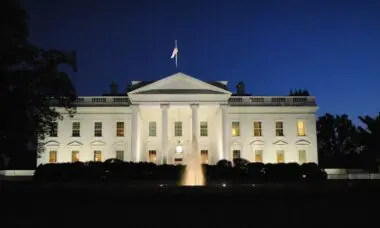 The US government is opposing a bill that would prevent the Food and Drug Administration (FDA) from enforcing a ban on menthol cigarettes it proposed last year.
The US government is opposing a bill that would prevent the Food and Drug Administration (FDA) from enforcing a ban on menthol cigarettes it proposed last year.
The new proposed FDA standards on menthol in cigarettes, which provoked mixed reactions from industry insiders and the public when it was unveiled, would be made inapplicable by provisions contained in a House of Representatives law which the Biden administration said it would veto if Congress passed it.
The Agriculture, Rural Development, Food and Drug Administration and Related Agencies Appropriations Act (HR 4368) for the fiscal year 2024, drafted by the US House of Representatives Committee on Appropriations, would specifically prevent the FDA from enforcing the new standards, which ban menthol flavour in cigarettes as well as all flavours other than tobacco in cigars, and set a cap for nicotine levels in cigarettes.
Section 769 of the proposed act reads: “None of the funds provided by this Act, or provided from any accounts in the Treasury of the United States derived by the collection of fees available to the agencies funded by this Act, may be used by the Secretary of Health and Human Services to finalize, issue, or implement any rule, regulation, notice of proposed rulemaking, or order setting any tobacco product standard that would prohibit menthol as a characterizing flavor in cigarettes or prohibit characterizing flavors in all cigars and their components and parts.”
Protecting youth and preventing cancer
The bill’s provisions on the new FDA standards on tobacco products were among the targets of White House criticism. In its Statement of Administration Policy on HR 4368, the government said: “The Administration is concerned that the Committee bill also threatens FDA’s ability to protect the nation’s youth from tobacco products by prohibiting FDA from eliminating menthol in cigarettes, flavors in cigars, and from setting science-based nicotine standards that reduce the addictive properties of these products.”
The White House also highlighted the danger flavours in tobacco products represent for young users: “Menthol in cigarettes and characterizing flavors in cigars, such as fruit punch and cocoa, increases smoking appeal, particularly among youth and young adults, leads to regular tobacco use, and decreases the likelihood of cessation.”
It added: “More than a half million youth in the United States use flavored cigars.”
The document also said that the new proposed standards would be in line with the government’s cancer campaign, called Cancer Moonshot, which initially focused on cancer research and to which a new goal of curbing cancer mortality rates was added by president Joe Biden in 2022.
The White House said: “FDA’s work on tobacco is a critical piece of the administration’s reignited Cancer Moonshot to reduce the death rate from cancer by at least 50% over the next 25 years.”
Changing views might lead to e-cig menthol ban
The proposed menthol ban would not directly impact e-cigarettes. Indeed, at one point there was optimism that it might prove a benefit for the vapour sector, driving former menthol smokers towards legal menthol-flavoured e-cigarettes.
However, the FDA’s scepticism about menthol in combustibles now seems to be extending to e-cigarettes too. Of the small number of marketing orders granted to vapour products – allowing them to be sold legally – all have been for tobacco flavour, while menthol products (and those of other flavours) have been denied the orders.
The agency’s perception of menthol e-cigs appears to have shifted away from seeing them as a reduced-risk option for menthol combustible users, and towards seeing them as another example of non-tobacco flavours potentially attracting under-age users.
So implementation of a ban on menthol in combustibles may, if anything, make it more likely that a similar prohibition could one day be formally applied to e-cigarettes.
Could Mexico’s cartels benefit?
When the White House’s statement was released on 24th July, a group of Republican senators expressed concerns over the menthol ban supported by the Biden administration, which, they say, would fuel the black market.
In a letter to FDA commissioner Robert Califf, senators Bill Cassidy, Marco Rubio, Ted Budd and Bill Hagerty said they thought that crime organisations out of Mexico may start trafficking menthol cigarettes and other tobacco products in the US if the agency’s new proposed standards are enforced.
“We are concerned that Mexican transnational criminal organisations (TCOs), and other criminal elements, could seek to exploit black market opportunities that such policies could create,” the senators wrote.
They were particularly worried about the proposed menthol ban and nicotine level cap.
While not taking any specific positions on these two restrictions, the senators said they believed the FDA should work together with other state agencies addressing international trafficking and crime, such as the Drug Enforcement Administration (DEA), in order to “mitigate” risks.
“We encourage FDA to address concerns with its current enforcement approach, including in conjunction with issuing any future rules, and to work closely with other federal agencies who have a thorough understanding of TCOs when enacting and implementing policies related to tobacco products,” the letter reads.
Study hails benefits of ban for minorities and youth
Opposite opinions were expressed to the US government by members of the scientific community, who urged the FDA to ban menthol cigarettes as soon as possible.
In an article published this month in the American Journal of Preventive Medicine, researchers from the University of Waterloo in Canada and from London’s Imperial College in the UK urged the FDA to implement the menthol ban as soon as possible based on lessons learnt from other countries, Canada in particular.
The study’s authors said the ban would benefit minorities and young people, who, they said, are among the favourite targets of menthol cigarette sellers.
“The public health benefits will be greatest among population groups who suffer health disparities arising from disproportionate use of menthol cigarettes because of targeted marketing, including young people, women, and racial and ethnic minorities, particularly Black Americans,” the authors wrote.
– Tiziana Cauli ECigIntelligence staff
Photo: Tabrez Syed







